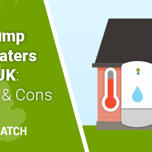Answer these simple questions and we will find you the BEST prices
Which type of solar quotes do you need?
It only takes 30 seconds
100% free with no obligation

Get up to 4 quotes by filling in only 1 quick form

Install a heat pump for less with the BUS grant

We’ve helped over 500,000 homeowners reduce their carbon footprint
- GreenMatch
- Heating
- Electric Heating Options
Electric Heating: Find the Best Option for Your Home

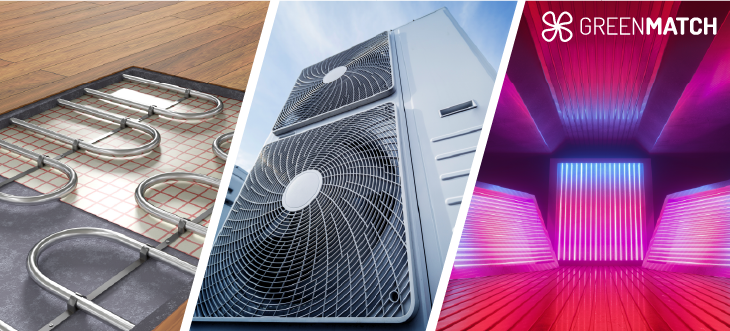
Electric heating has become an increasingly widespread and popular heating option in the UK. The global demand for natural gas and the subsequent market spikes have only exacerbated the need to bring forward affordable, reliable energy alternatives.
This makes electric heating, along with other forms of low-carbon heating, far more competitive. However, the cost of electricity will have to come down if electric heating systems are to become truly viable. Electricity is mostly generated from burning natural gas which implicates its wholesale price, therefore leading to high running costs for electric heating.
A nationwide upscaling of renewable energy production, and the right government policy, would see a drastic reduction in the cost of electricity. At the same time, it's easy to see why some would be reticent when seeing heat pump costs.
In this article, you'll learn what the options are when it comes to electric heating, how much they cost, and how suitable they might be for your home. Whether you’re currently looking for a new electric heating system, or considering it for the future, this article has got you covered.
To ensure that you're making the right choice for your home, you can fill out the form below and we will then come back to you to provide you with up to 3 different supplier quotes that are located close to your place. You are then free to pick the one you prefer. Of course, the service we provide you is free of charge and with no obligation so do not hesitate any longer and try it out!
- Quotes from local engineers
- Payment by finance available
- Save £7,500 with BUS grant
It only takes 30 seconds



What Is an Electric Heating System
Electric heating systems are simply heating systems that use electricity as their main source of energy. They are highly efficient and there is a wide range of options meaning homes of all sizes and energy requirements can find something suitable. Electric heating systems, such as electric boilers, are most common in homes with no connection to the gas grid, especially in smaller homes and flats.
One of the greatest advantages of electric heating is that it does not produce any CO2 emissions as it runs. Increasing renewable energy generation in the place of fossil-fuelled power stations would bring forward a renewable energy market that simultaneously alleviates cost of living pressures, stabilises energy prices, and decarbonises our heating.
Types of Electric Heating Systems
There are various types of electric heating systems for you to consider, these include:
- Electric boilers
- Electric underfloor heating
- Infrared panels
- Electric storage heaters
- Air source heat pumps
- Ground source heat pumps
Homes of any size will find a suitable electric heating system within this range of options. Below we’ve broken down how these systems work, their pros and cons, and whether they will suit your home's energy needs.
Estimating your energy demands and finding the appropriate heating system is important to ensure you are not wasting energy, and therefore money, in the long term. That’s where a professional electric heating installer will help you.
GreenMatch has a network of licensed engineers who can assess your home's suitability for electric heating and offer you tailor-made quotes for their installation services. By filling in our quick and easy form, you will be connected with up to 3 heat pump installers, local to you.
- Quotes from local engineers
- Payment by finance available
- Save £7,500 with BUS grant
It only takes 30 seconds



Electric boilers
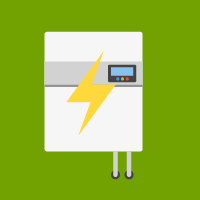
Electric boilers heat water with internal electrical elements. It is then used to provide heating and domestic hot water, through your central heating or underfloor heating system.
Direct electric boilers heat mains water on demand for immediate use. Electric storage boilers heat the water and then store it in a hot water cylinder, or internally for later use. Dry core storage works similarly, but the heat is stored in bricks and then released to heat water when needed.
With electric storage boilers, the Economy 7 or 10 tariffs are available. These allow you to heat the water overnight, or at off-peak times so you can take advantage of cheaper tariff rates.
- Highly efficient. 99-100% efficiency rate.
- Requires very little maintenance. No need for annual gas safety checks
- Flexible installation. No flue or condensate pipe.
- Saves space in the home. Direct electric boilers with no external units take up very little space in your home.
- Renewable energy: Compatible with solar PV or solar thermal for hot water.
- Not suitable for large homes. Usually can only supply to small homes, with heating outputs up to 24kW.
- High running costs. Cost of electricty nearly five times as much as gas boilers.
Will electric boilers suit my home?
Electric boilers are generally suited to smaller homes and flats. Without additional installation parts such as a flue or condensate pipe, there’s some freedom as to where you can install them since they don’t have to be kept on an outside wall.
For the smallest homes, electric combi boilers (direct heating) are a great option since they operate entirely from one unit, which saves you space. For medium-sized homes with higher energy demands, an electric storage boiler with an external hot water cylinder is a better fit.
As for larger properties, electric boilers may struggle to meet your energy demands. Typically, electric boilers have available heating/hot water outputs up to 24kW, meaning they are best suited to homes with up to 15 radiators and no more than 1 bathroom.
Electric underfloor heating
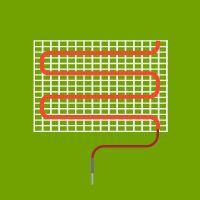
Electric underfloor heating provides warmth using electrical wiring, or heating mats, that are laid beneath the floor. Typically, underfloor heating is used in one room, usually the bathroom, and isn’t commonly used to heat an entire property.
Electric underfloor heating can be used as a substitute for central heating radiators and the heat output can be regulated with a range of thermostats, helping you to better manage the running costs.
- Easy installation. Less disruptive and takes up less space than wet underfloor heating.
- Efficient heat up times. Warms up quicker than wet underfloor heating.
- More control. Runs at lower minimum temperatures than central heating radiators.
- Efficient heat. Even distribution of heat compared to central heating radiators.
- Expensive to install. More disruptive installation than other electric heating systems.
- Higher running costs. Expensive to heat an entire property.
- Insulation required: Will not work efficiently without floor insulation.
- Heat only: Does not provide domestic hot water.
Will electric underfloor heating suit my home?
While electric underfloor heating are more affordable to install, the cost to run electric underfloor heating across an entire property will cost considerably more than wet underfloor heating. Therefore, with the long-term running costs in mind, wet underfloor heating or alternative electric heating is better for large-scale projects.
However, if you're renovating one room on a tight budget, then electric underfloor heating is more easily fitted, even in small or irregular-shaped rooms.
Infrared panels

Infrared panels convert electricity into infrared light. This heat energy emits from the surface of the panels to directly heat people or objects, rather than via convection-based space heating used in traditional heating systems. This is the same radiation we feel from the sun, without any of the harmful UV rays.
Infrared heaters can also come in custom designs or disguised as a mirror, giving them a discreet and multipurpose quality. It can also be installed as underfloor heating. However, these options will cost significantly more.
- Highly efficient. Highly responsive heat-up time with 100% heat efficiency.
- Reduced heat loss. Heat will not escape in draughts or through the ceiling.
- Easy installation. Simple wall-or-ceiling-mounted installation.
- Saves space in the home. Requires less space and is less disruptive than most other electric and conventional heating options.
- Expensive to install. You can expect to pay up to £10,000 for a three-bedroom home.
- Affected by room temperature. Incoming cold air will still affect the room temperature.
- Heat only. Does not provide domestic hot water.
Will infrared panels suit my home?
Infrared panels are versatile and can be installed in any sized room, across an entire home. Like underfloor heating, infrared panels are installed per room that you require them.
Standard panels typically fall between £120-£200 per panel. For every cubic metre, 25 watts of electricity is needed. Therefore, a 30m³ room will require 750W, although this can vary depending on how effective the insulation of the room is. Standard panels have a power output of up to 900W.
Electric storage heaters

Electric storage heaters are the most common type of electric heating in the UK. Heat is generated using electricity and then stored internally, often within large clay bricks at the core of the heater.
The heat is then gradually released into a room on demand. Some advanced heaters have a fan that helps heat a room faster. The heat output is adjustable using various types of heating controls, including programmers that allow you to pre-set the temperature of the room at optimal times. Once the heat is used up, these heaters need to be re-charged.
Like storage boilers, storage heaters can also take advantage of cheaper tariff rates through the Economy 7 and 10 tariffs. Therefore, most homes find the best time to charge your heater is overnight.
- Cheaper tariff rates. Economy 7/10 tariff rates allow you to make savings with every penny.
- Extra control. Input and output controls mean you can regulate the energy spent on storing and emitting heat.
- Advanced control settings. Modern ‘boost’ function means you’ll never run out of heat.
- Reduced heat loss. Modern heaters come with advanced heat retention.
- Run out of heat. Risk of using up the stored heat before the evenings, when you’ll likely need it most.
- High running costs. Nearly five times as expensive compared to conventional heating even with Economy 7/10 tariffs.
- Energy intensive. ‘Boost’ function is expensive to run.
Will electric storage heaters suit my home?
Storage heaters are available in a range of sizes that will heat any sized room. For one room of around 60m³, a heater with a 3kW output will be required. This would lead to monthly costs of around £100.
They are best suited to small-to-medium homes with good insulation. For larger homes, it is not economical to deploy electric storage heaters as you will require significantly more heat which will be very expensive to run.
Air source heat pumps
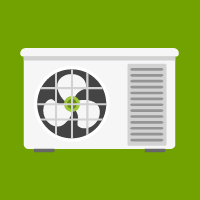
An air source heat pump (ASHP) transfers heat extracted from the outside air to inside a building. Air to air heat pumps directly heat the air using air conditioning whereas air to water heat pumps provide high volumes of domestic hot water as well as heat via a central heating system. They can also operate as a cooling system during the summer months.
Air-to-water systems usually include an outdoor and an indoor unit. Some will also come with a hot water cylinder for hot water storage. ASHP’s are highly efficient, low-carbon heating systems, although their seasonal efficiency can vary. That being said, some models will still operate in temperatures as low as -25°C.
- Highly efficient. Efficiency rates of up to 400%.
- Combine with pre-existing system. Provides heating and cooling and can be combined with central heating, underfloor heating, and can be solar powered.
- Long lifespan. Live as long as 20-25 years.
- Government grants available. The Boiler Upgrade Scheme (BUS) offers £6,000 off the upfront installation costs.
- Suitable for large properties. Can provide heating and domestic hot water to large properties with high energy demands.
- High installation costs.Installation is expensive without the BUS grant.
- Insulation required.Ineffective without sufficient insulation.
- Regular maintenance. Yearly maintenance required, twice a year if it also provides cooling.
Will air source heat pumps suit my home?
Air source heat pumps will easily meet the energy demands of any sized home. Installing a new air source heat pump requires that you have outdoor space available, and indoor space if it's a split system with two separate units.
The size and type of heat pump will affect the exact amount of space you need. A typical outdoor unit is 1200mm wide, 930mm high, and 370mm deep.
Larger properties with higher energy demands may require more than one outdoor unit. This is known as a cascaded system where multiple units work together. These are usually stacked on top of each other. If your system also provides domestic hot water, then you will also need indoor space for a hot water cylinder.
To learn about your home's suitability for heat pump installation, fill in our quick and easy form to be contacted by up to 3 heat pump installers. From there, they can assess your home’s unique specifications and offer you tailor-made quotes. With multiple quotes, you can take advantage of the best deals within your area. This service is free with no obligation.
- Quotes from local engineers
- Payment by finance available
- Save £7,500 with BUS grant
It only takes 30 seconds



Ground source heat pumps
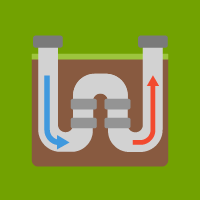
A ground source heat pump (GSHP) works similarly to air source heat pumps, in that they extract heat from the outdoors and transfer it indoors for space heating and domestic hot water use. They differ in that they extract heat from below ground, where temperatures remain around 8-15°C all year round.
These closed-loop systems work by pumping a mixture of water and antifreeze into pipes installed about 2 metres below the earth. The underground temperatures heat the liquid which is fed to a heat exchanger which transfers the heat to a gas refrigerant. The gas is heated further by a compressor and distributed through the central heating system.
GSHP’s come in various types and sizes. They can also come as an open-loop system where water is taken from the ground and heat is extracted.
They can also be vertically installed 50-150 metres into the ground, for homes with limited horizontal outdoor space. This alternative is significantly more expensive, with upfront costs running up to £21,000 for a 4-bedroom home.
- Highly efficient. Efficiency rates of up to 400%.
- Combines with existing system. Provides heating and cooling and can be combined with central heating, underfloor heating and can be solar powered.
- Long life span. Above-ground units last 20-25 years, below ground loop systems last as long as 50 years.
- Seasonal efficiency. Stable underground temperatures mean efficiency is not implicated by cold winter air.
- Government grants available The Boiler Upgrade Scheme (BUS) offers £6,000 off the upfront installation costs.
- Less maintenance required. Professional maintenance is needed every 3-5 years, far less often than ASHP’s.
- High installation costs.Expensive upfront costs without the BUS grant.
- Relies on underground conditions. Only suitable for homes with appropriate bedrock and soil composition.
- Tales up space. Horizontal systems require sufficient space for installation.
- New builds only. Not recommended for retrofit installation.
Will a ground source heat pump suit my home?
Installing a new ground source heat pump requires significant outdoor space, making them more common in rural areas. Horizontal GSHP pipes are dug around 2 metres into the ground. A typical three-bedroom house will require around 600m2 of pipes to be laid and an outdoor area between 300-700m². The area will also need to be accessed by machinery during the installation process.
A GSHP can also be vertically installed in homes where there isn’t enough horizontal space. In this case, a hole of at least 6 metres will need to be dug for 50-150 metres of pipes. Vertical installation is only possible if the soil composition is compatible with your home’s heating requirements.
How Much Do Electric Heating Systems Cost?
Below we’ve provided the average costs for each type of electric heating. These estimates include the cost of supply and installation for an average three-bedroom home (where applicable) and includes VAT.
| Electric heating system | Average price range (inc. installation) |
|---|---|
| Electric boilers | £1,000 - £2,600 |
| Electric underfloor heating (inc. infrared) | £40 - £90 per m² |
| Infrared panels (inc. designer) | £120 - £600 per panel |
| Electric storage heaters (new) | £800 - £2,000 |
| Air source heat pumps | £12,000 to £17,000 |
| Ground source heat pumps | £16,000 to £25,000 |
Once electric heaters are in place, they require very little maintenance. Unlike gas boilers, they do not require an annual service, saving you between £80 - £120 per year.
The cost of servicing and repairs of heat pumps can reach totals of £150. Air source systems will require a professional maintenance checks at least once a year, twice a year if it’s also used for cooling. Ground source systems on the other hand will only require maintenance checks every 3-5 years.
The cost of supply and installation will vary from home to home, based on the type of system you are installing, the size of your home, and where in the country you live.
To find out your home's suitability for ground, or air, source heat pump installation, then it’s best to source multiple engineers so you have multiple quotes to compare. This will help you land the best deal. However, finding reputable heating engineers that specialise in heat pump installation, and then explaining your home heating situation can take some time.
GreenMatch’s quick and easy form will do most of this for you. With this information, we’ll select the best heat pump installers in your area. You will then be contacted by up to 3 installers within 48 hours. With their free, no-obligation quotes, you have the opportunity to select from the best deals in your area.
- Quotes from local engineers
- Payment by finance available
- Save £7,500 with BUS grant
It only takes 30 seconds



Electric Heating vs Gas Heating
How does electric heating stack up next to gas-fuelled heating? If you have a connection to the gas grid, then you might be considering a traditional gas boiler as opposed to an electric heating option. Below we’ve outlined some of their key differences for you to weigh up.
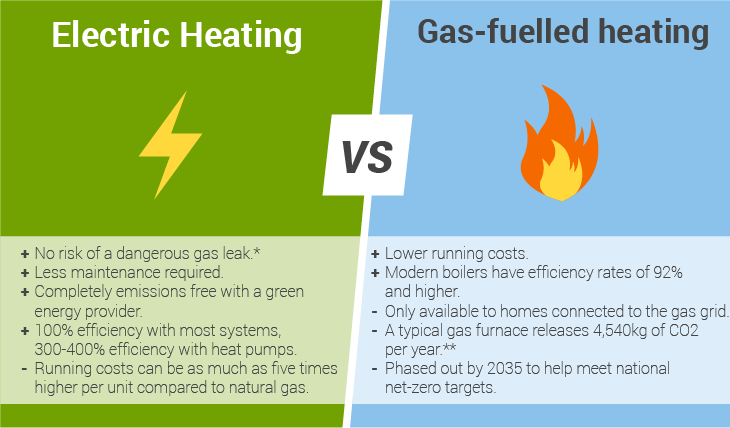
* Can you detect the smell of gas from your boiler? Call the Gas Emergency Service on 0800 111 999.
** Source: www.forestresearch.gov.uk/
Running costs for electric heating will vary depending on the type of system and the size of your home. However, according to Ofgem, the current energy price cap unit rate for electricity is 28p per kWh and 7p per kWh for natural gas. Therefore, you will spend nearly five times as much on electric heating than gas-fuelled heating per unit.
Even with the higher running costs of electricity, households can still save significantly more with a highly efficient heat pump than with a gas boiler. Under the current price cap, households will save £261 per year with an efficient heat pump compared to a gas boiler.
Additionally, the UK government plans to issue proposals that will go toward rebalancing the cost of energy so that green levies are shifted from electricity to gas bills. This would go towards bringing down the cost of electricity and incentivising the shift to electric heating. For more information on this topic, including an exact comparison of the electric boiler running costs vs gas, please read our full article.
Frequently Asked Questions
The most energy efficient electric heating system comes from heat pumps, which operate at 300%-400% efficiency. This means that for every unit of electricity used, 3-4kW of usable energy will be provided.
Infrared heating systems, such as panels or underfloor wires/mats, produce heat that does not circulate with the air. Therefore, there is less heat loss from draughts and poor insulation. This makes them highly efficient and will amount to less monthly running costs, compared to other forms of electric heat.
There are various ways to heat your home using electricity as the main source of energy. These include:
The most significant disadvantage to electric heating is the expensive running costs. Under the current energy price cap, electricity is £0.28 per kWh and £0.07 per kWh for natural gas, meaning you will spend nearly five times as much on electric heating than gas-fuelled heating per unit.
Electric heating, such as electric boilers, underfloor heating, and storage heaters, are great options for small-to-medium sized homes. They offer 99%-100% efficiency rates and produce no emissions while they operate. This makes them safer to keep in your home and reduces your carbon footprint. The running costs of electric heating makes gas boilers a more affordable option for many. However, with a highly efficient electric heat pump, you could make annual savings of £261 compared to gas boilers under the current energy price cap.

Ciaran is a content writer at GreenMatch. Whether writing about sustainable aviation fuel or heat pumps, Ciaran has passion for informing readers about pivotal technologies that are reshaping our world.
We strive to connect our customers with the right product and supplier. Would you like to be part of GreenMatch?



